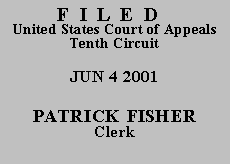

William Stock, a state prisoner appearing pro se, seeks a certificate of appealability to appeal the district court's dismissal of his 28 U.S.C. § 2254 habeas petition. We deny a certificate of appealability and dismiss the appeal.
Stock's habeas petition was filed after April 23, 1997, and the provisions of the Anti-Terrorism and Effective Death Penalty Act (AEDPA) apply. The AEDPA requires federal courts entertaining federal constitutional claims that first were adjudicated on the merits in state court to give deference to the state court's analysis and to grant relief only where the state court's decision "was contrary to, or involved an unreasonable application of, clearly established Federal law, as determined by the Supreme Court of the United States." 28 U.S.C. § 2254(d)(1).
In 1985, Stock was on parole from the New Mexico prison system when he committed the crimes of kidnapping, burglary, and armed robbery in Arizona. In 1986, New Mexico issued a parole violation detainer warrant for Stock, who was then in prison in Arizona following conviction for his 1985 crimes. Stock is still in prison in Arizona, and New Mexico has not held a parole revocation hearing or taken any action on the warrant. In his habeas petition, Stock contended that New Mexico's failure to take action on the warrant violated his federal due process rights. He asked that New Mexico be directed to either lift the detainer or take him into custody.
The magistrate judge cited McDonald v. New Mexico Parole Board, 955 F.2d 631 (10th Cir. 1991), and found that "the law is clear that until [Stock] is taken into custody by New Mexico authorities, he has not been deprived of a liberty interest simply because the paroling authority has lodged a detainer with the institution in another state where he is incarcerated as a result of a subsequent crime." Record, Doc. 11 at 2. The magistrate recommended that the petition be dismissed. After considering Stock's objections to the magistrate's report, the district court dismissed the petition.
In McDonald, the prisoner was on parole from the New Mexico prison system when he committed crimes in Texas. After he was imprisoned in Texas, New Mexico filed a parole violation detainer warrant, but made no effort to hold a parole revocation hearing while the prisoner was incarcerated in Texas. The prisoner filed a habeas petition, arguing New Mexico's refusal to hold an immediate hearing or to remove the detainer violated his due process rights. We affirmed the district court's dismissal of the petition, stating:
Where Petitioner has been convicted of an intervening offense, the preliminary hearing is unnecessary because probable cause has already been established by the subsequent conviction. [Citations omitted.]
The hearing requirements and time limitations must be adhered to only after the parolee is taken into custody as a parole violator. [Citation omitted.] New Mexico did not execute the warrant, and Petitioner was not taken into custody by the New Mexico authorities. Until he is, he has not been deprived of a liberty interest by New Mexico state action, and is not entitled to the due process safeguards set forth in [Morrissey v. Brewer, 408 U.S. 471 (1972)].
955 F.2d at 633-34. Here, New Mexico has not executed the warrant against Stock or taken him into custody. Therefore, Stock's due process right to a revocation hearing has not yet ripened, regardless of how much time has passed.
Stock argues he is being denied educational and rehabilitation opportunities because of the detainer. The same argument was made and rejected in McDonald, where we found the claims were general, speculative, and unsupported by the record. We concluded that "[e]ven if Petitioner's claims were well grounded, however, the Supreme Court has rejected the concept that these kinds of adverse consequences of state action trigger a due process concern." 955 F.2d at 634 (citing Moody v. Daggett, 429 U.S. 78, 88 n.9 (1976)).
As Stock has failed to make "a substantial showing of the denial of a constitutional right," 28 U.S.C. § 2253(c)(2), the request for a certificate of appealability is DENIED. This appeal is DISMISSED. The mandate shall issue forthwith.
Entered for the Court
Mary Beck Briscoe
Circuit Judge
*.This order and judgment is not binding precedent, except under the doctrines of law of the case, res judicata, and collateral estoppel. The court generally disfavors the citation of orders and judgments; nevertheless, an order and judgment may be cited under the terms and conditions of 10th Cir. R. 36.3.